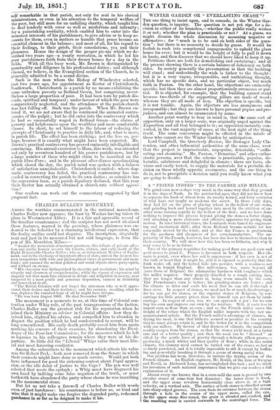CHARLES BULLER'S MONUMENT.
Amoicu the worthies commemorated in the national mausoleum, Charles Buller now appears ; the bust by Week-es having taken its place in Westminster Abbey. It is a fair and agreeable record of the familiar countenance ; and the sculptor has not muck idealized those features, marred in the growing, whose plainness was en- deared to the beholder by a charming intellectual expression, that the faulty outline could not disguise. The inscription, singularly neat and just in its measured but not cold language, is from the pen of Mr. Monckton Milnes-
" Amidst the memorials of maturer greatness, this tribute of private affec- tion and public honour records the talents, virtues, and early death of the Right Honourable Charles Buller ; who as an independent Member of Parlia- ment, rind in the discharge of important offices of state, united the deepest hu- man sympathies with wide and philosophical views of government and man- kind ; and pursued the noblest political and social objects above party-spirit, and without an enemy.
"His character was distinguished by sincerity and resolution ; his mind by vivacity and clearness of comprehension ; while the vigour of expression and singular wit that made him eminent in debate and delightful in society, were tempered by a most gentle and generous disposition, earnest in friendship and benevolent to all.
"The British Colonies will not forget the statesman who so well appre- ciated their desires and their destinies ; and his country, recalling what he was, deplores the vanished hope of all he might have become. "He was born August 1806. He died November 1848."
The monument is a memento to us, at this time of Colonial con- tention under Whig rule, of the past transgressions of the faction. Charles Buller ran the greatest risk for his reputation when he joined their Ministry as adviser in Colonial affairs : how they de- ceived him, slighted his advice, and compelled him to abandon in disgust the position which he had condescended to accept, will be long remembered. His early death probably saved him from again marking his censure of their evasions, by abandoning the Presi- dency of the Poor-law Commission ; for the measures which he left as legacies to his colleagues remain where they were at his de- parture. So little did the " Liberal " Whigs value their most libe- ral and most farseeing coadjutor.
Among the subscribers to the monument which attests his value was Sir Robert Peel,—both now removed from the Senate in which their counsels might have done so much service. Would not both have influenced for good the sickening contest about Papal aggres- sion, or the idle delay of justice to the Cape? The pen was well selected that wrote the epitaph : a Whig must have disgraced his own hand by inditing some false negation of the truth, or must forthwith have abandoned the party whose shame he was inscribing on the monumental stone.
But let us not take a farewell of Charles Buller with words even of just harshness : his countenance is before us, so kind and wise that it might make one forgive the degraded party, redeemed perchance in BP far as.he deigned to make it his.


























 Previous page
Previous page